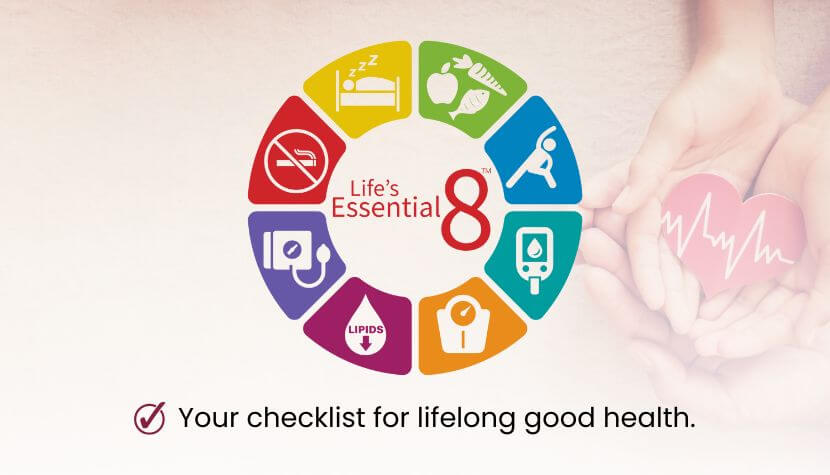
Improving and maintaining cardiovascular health can help you enjoy a longer, healthier life. Better cardiovascular health has also been associated with decreased risk for heart disease, stroke, cancer, dementia, and other major health problems.
The Life’s Essential 8™ checklist contains easy-to-understand and actionable goals. To adopt the ‘essential 8’ over the long term, it’s first important to note where you are in your health journey and know that even small changes can make a big difference if you continue to build on them over time. It’s also important to stay engaged with your healthcare team to measure your progress. Maybe your blood pressure or blood sugar levels are higher than you’d like. That’s an excellent opportunity to set a goal and develop a plan with your primary care doctor. Lastly, knowing that this checklist can improve your health can go a long way.
Life’s Essential 8™
Your checklist for lifelong good health from the American Heart Association:
- Eat Better. Aim for an overall healthy eating pattern that includes whole foods, lots of fruits and vegetables, lean protein, nuts, seeds, and cooking in non-tropical oils such as olive and canola.
- Be More Active. Adults should get 2 ½ hours of moderate or 75 minutes of vigorous physical activity each week. Kids should have 60 minutes every day, including play and structured activities.
- Quit Tobacco. The use of inhaled nicotine delivery products, which includes traditional cigarettes, e-cigarettes, and vaping, is the leading cause of preventable death in the U.S., including about a third of all deaths from heart disease. And about a third of U.S. children ages 3-11 are exposed to secondhand smoke or vaping.
- Get Healthy Sleep. Most adults need 7-9 hours of sleep each night. Children require more: 10-16 hours for ages five and younger, including naps; 9-12 hours for ages 6-12; and 8-10 hours for ages 13-18. Adequate sleep promotes healing, improves brain function, and reduces the risk of chronic diseases.
- Manage Weight. Achieving and maintaining a healthy weight has many benefits. Body mass index, a numerical value of your weight in relation to your height, is a helpful gauge. Optimal BMI is less than 25, but less than 18.5 is considered underweight. You can calculate it online or consult a healthcare professional.
- Control Cholesterol. High levels of non-HDL, or “bad” cholesterol,” can “lead to heart disease. Your primary care provider can consider non-HDL cholesterol as the preferred number to monitor, rather than total cholesterol, because it can be measured without fasting beforehand and is reliably calculated among all people.
- Manage Blood Sugar. Most of our food is turned into glucose (or blood sugar) that our bodies use as energy. Over time, high blood sugar levels can damage your heart, kidneys, eyes, and nerves. As part of testing, monitoring hemoglobin A1c can better reflect long-term control in people with diabetes or prediabetes.
- Manage Blood Pressure. Keeping your blood pressure within acceptable ranges can keep you healthier longer. Levels less than 120/80 mm Hg are optimal. High blood pressure is defined as 130-139 mm Hg systolic pressure (the top number in a reading) or 80-89 mm Hg diastolic pressure (the bottom number).
It’s never too late to make better health choices. Achieve ideal cardiovascular health by adhering to the eight branches of Life’s Essential 8. Click here to learn more about the 8.
